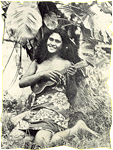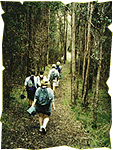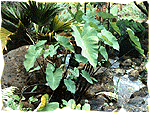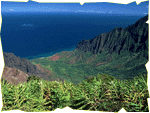 |
 |
 |
|
|||
|
Part 2: Hawaiian Treasure: Kindy Sproat

Hal: There's a house at the end of the road where Kindy and Cheri live. Perched on the cliff, it overlooks the Pololu Valley. This is an extraordinary place by any reckoning, but Kindy's tie is more personal. He grew up here, as did his mother and grandmother, and a whole line of ancestors. Hal: It's late afternoon. Kindy's godson, Josh, has come here after school for a ukulele lesson. We sit on the deck on lawn chairs, with a million-dollar view in back of us. Hal: But Josh is now 14, tall with knowing green eyes and crazy, jet-black hair. Josh's mom is like family here, even though she's a transplanted New Yorker. Josh never had a real father and Kindy has been there for him since he was born. Around here, all the kids call older friends "Uncle" or "Auntie." Josh calls Uncle Kindy his treasure.

Hal: Kindy uses the term "sticky brain" to describe the kind of person who remembers all the details. Even though Josh doesn't have an ounce of Hawaiian blood in him, Kindy has found a willing sticky brain to pass on a world of lore and history. Kindy grew up with a traditional respect for his elders and the knowledge they could impart. Now, in his late sixties, he is an elder himself, passing on knowledge in the traditional way -- by demonstration. But with all there is to learn, there's still plenty of room for play. Josh offers us a show-stopper, "Jazzy G."
Hal: After a few tunes we start talking about all sorts of things Hawaiian. I'm curious about that Island word, aloha, emblazoned on everything from beach bags to jumbo jets.
Hal: Josh catches Kindy smiling at him proudly. But it's not just Kindy who is proud. Josh finds the attention embarrassing, as any 14 year-old would, yet the respect is reciprocal.

Hal: The sun has set and there's a kind of silence before the night falls. Kindy sniffs the air and sighs with pleasure. He asks quietly if Josh wants to join him in a song about the beauty of this part of the Island, Kohala. Hal: Though we've only been here a brief time we feel the Aloha spirit. Kindy and Josh have planned a hike in the morning and they ask if we want to go along. Somehow, I'm starting to sense that Josh is not the only student here. Kindy has invited us into his world with an open heart. I just hope I can hold this moment with what's left of my sticky brain. Teresa: It's morning, bright and clear and we've picked up a trail that follows the high ridge above the Pololu Valley.

Hal: Every few feet Kindy stops to show us something. He peels a long strip of bark off one tree, gives me one end, and challenges me in a tug-of-war. It turns out to be an incredibly strong natural strapping material for canoe building. He picks two different kinds of guava for us to taste. He shows us medicinal leaves and berries, all the time progressing along the trail. Hal: It's almost with shock that we bump into a line of tourists with cameras dangling around their necks. Leading them on their nature walk is a handsome young Hawaiian wearing neatly pressed Bermuda shorts and a Four Seasons golf shirt.
Hal: Kindy seems anxious to show us something up the trail.
Hal: We scramble up the hillside through thick brush to a lookout that reveals the entire valley and the wide Pacific beyond. It takes my breath away.

Hal: Kindy tells us about this place of his ancestors, and as he talks, we begin to see this valley not as overgrown and uninhabited, but with villages and people, taro patches and gardens everywhere. Kindy's ancestors were canoe builders, navigators and historians. On the walls of his great-grandmother's hut hung maps made of seashells and twine, charting tides, wind patterns and the islands of Polynesia. Kindy explains that even without a written language, Hawaiians knew who they were and where they came from. Everyone could chant their genealogy. There were even those in his family who were chosen to remember the past. They actually put their lives on the line for the sake of history.
Teresa: Like the lines that connected the Islands on those ancient charts, the lines that connected families and villages in Hawaii were critical to every chance meeting along the forested trails.
Teresa: But with the coming of Europeans after Captain Cook's initial voyage to Hawaii, that critical connectedness was shattered forever. Strangers were called Haoles, Ha-ole, without the breath of life, without a common ancestor. Plenty of Haoles have left their mark on this valley. Today much of North Kohala, including almost all of the Pololu Valley, belongs to a Japanese investor and before him, a big sugar plantation diverted the water that fed these valleys, which made it impossible for the villages to survive. Kindy has watched old Hawaii disappear before his eyes from this perch on the mountainside. Amazingly, he's not bitter.
For suggestions on Hawaiian Literature, be sure to visit:
|
 | American Public Media Home | Search | How to Listen ©2004 American Public Media | Terms of Use | Privacy Policy |


